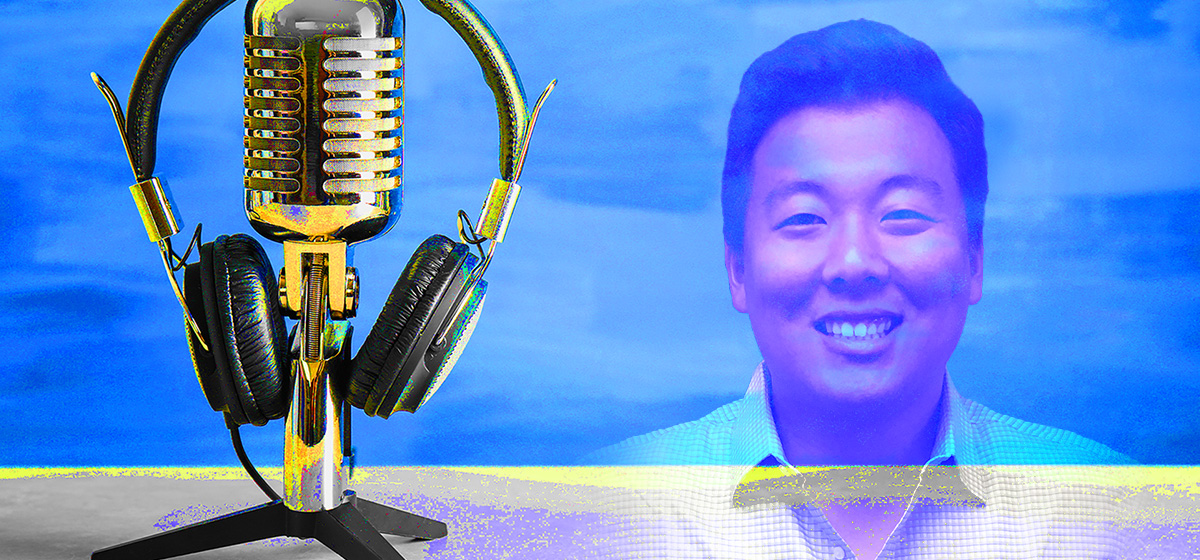Pittsburgh Flies Into the Future

Donald Bonk interviews Dick Zhang, founder of Identified Technologies, a drone company, as part of the Pittsburgh Tomorrow podcast series. This interview was conducted before COVID-19. The transcript is abridged and edited for clarity.
View the episode archive here. View Dick Zhang’s profile here.“Without a doubt, Pittsburgh can absolutely be the place for all things technology, robotics and artificial intelligence.” – Dick Zhang, founder of Identified Technologies
Donald Bonk: Welcome, Dick. Please tell us a little bit about how you ended up in Pittsburgh and where you started.
Dick Zhang: We’re all about real-time mapping in the construction business, and we use drones to capture and process the data for project management purposes on the job site.
Bonk: Has this use of drones been developing over a long time or is it more recent?
Zhang: The use of drones on construction job sites has, as a concept, been around for six or eight years. But in a true commercial environment, it started picking up over the last two or three years.
Zhang: Why don’t we just start with how you ended up in Pittsburgh?
Zhang: I was raised in central New Jersey. I went to the University of Pennsylvania, where I was studying to be a mechanical engineer. Halfway through my degree at Penn, I ended up not showing up for my fall semester. I went to work as an investment banker on Wall Street.
About six years ago, I felt like there was a lot of opportunity with this business and a lot of opportunity for me to grow. We moved out here for the deep technical expertise in the robotics fields and AI. Many of our early customers ended up being here. Our first investors were here.
We participated in a program called Alpha Lab Gear, a startup accelerator incubator run by Innovation Works, which is funded by the state. Ilana Diamond, who now runs Alpha Lab Gear’s program, sold me on Pittsburgh.
Bonk: Tell me about the evolution process of how you go from an Alpha project to sitting here now in your headquarters in East Liberty near Bakery Square.
Zhang: You always think that when you’re about to do it, it’s going to be a straight point A to point B or point C type of experience. Looking back on it, it is anything but that. You obviously keep working and keep putting in the effort. The progress happens. We arrived in Pittsburgh at the end of 2013.
Bonk: Now we’re seven years in the future in 2020. Just to give people a quick understanding of the company itself: How many people work with Identified Technologies as employees or staff?
Zhang: Just over two dozen people. Because we deliver the drone flying as a service, we have pilots staffed in key hubs around the country.
Bonk: What we’re interested in hearing today is about your views on Pittsburgh and Pittsburgh Tomorrow. What would make Pittsburgh the best city in the world?
Zhang: The single dimension that drives a “great city” is the people. It’s important to have passionate people. Smart people definitely do not hurt, but passionate people who want to contribute, be part of an issue and to have that impact on whatever their mission is—that’s the most important.
Bonk: What does Pittsburgh need to cultivate that mindset about having passionate people? Do you think passion is here now?
Zhang: I would say passion is here now. It’s definitely not here now in the quantities that you may get in some of the larger cities. As a resident and business owner, I would say definitively there is this minimum; I would not say critical mass. I would call it the minimum viable product.
Bonk: Is there anything that you would suggest that would help grow that critical mass of passionate, committed people that you feel Pittsburgh needs? Is it recreation or is it more transportation? Is there some external element that that you think would be a catalyst to adding those types of folks?
Zhang: You’re starting to ask questions around the quality of life here in Pittsburgh. And it’s absolutely the right question.
I don’t think that professional opportunities are the primary driver. Once people realize there’s opportunity here in the professional world, they start to ask these immediate questions: What’s it like to live here? Where do I live? How do I live, what do I eat, and where do I go for fun?
Maybe this is a reflection of the things that interest me. Housing and easy transportation without a vehicle are extraordinarily important.
You want to draw people that don’t have families and those that do. I noticed this in my own housing search. There are a large number of homes that are 100 years old. Admittedly, I’m not interested in having to upkeep a 100-year-old piece of property.
Bonk: How do you find the rental options for either you or staff?
Zhang: We’ve never been limited by the rental options. The city has always been able to fulfill our needs. There have been times when it’s been a search process, so the volume may not be there. But again, this is the chicken or the egg.
Bonk: Tell me a little bit about what would make Pittsburgh the best city, or ideal city, in terms of transportation. What’s the gap?
Zhang: The gap is that we need to be able to walk or with our own devices get between the key nodes. I don’t know what the answer for this is, but living in Philadelphia, I can get from University City to downtown. I can walk it in 20 minutes. I can take the SEPTA (subway); it takes maybe 10 minutes.
Neighborhoods in Pittsburgh are so scattered and diverse. There’s no way for me to get from East Liberty or Squirrel Hill down to the North Shore, for example. Or from anywhere in Pittsburgh to the airport. I should not be paying $70 dollars for an Uber ticket to get to the airport.
Bonk: Do you find that Pittsburgh is an ideal city in terms of what it offers you for out-of-office time options?
Zhang: I would say so. The things that are important to me are the culture and the arts. Pittsburgh has one of the greatest symphonies in the entire world. I have tickets. There’s no shortage of the culture or the arts and the history. Again, it may not be to the volume that’s present in other cities, and you may have to search a bit, but it’s certainly present.
The other thing that’s important to me is physical activities, and being able to do these outside. My biggest hobby outside of the office is racing triathlon and iron man long distance races. Being able to bike 40, 60, 100 miles is extraordinarily important to my training.
Bonk: Let’s just say we give you magical powers. What are three immediate things that you think would help Pittsburgh realize its future? Three wishes, if you will.
Zhang: The first is a community of experienced entrepreneurs. More important than people, more important than capital, more important than office space, than all of it, is entrepreneurs who have executed on a vision successfully and can guide the next generation.
Unfortunately, experience can only be gathered through failure. And so what I’m looking to do is draw the people that have that experience.
Bonk: 25 years ago, there wasn’t a drone industry. You’re an iterator in an industry sector. Do you feel that Pittsburgh has an opportunity to become a center for that kind of industry or business?
Zhang: Without a doubt, Pittsburgh can absolutely be the place for all things technology, robotics and artificial intelligence. One experience I had recently convinces me of this. I’m in another city and my friend had just seen a self-driving car pull up for the first time to pick us up. And it was nothing for me. We’ve been seeing Ubers and all these other different companies with self-driving cars for years in Pittsburgh. It’s just another daily thing.
We’re leading the way on these technologies—drones flying over Carnegie Mellon and Pitt’s campus. It is just another daily setting of some kind of really cool, awesome, almost freaky technology that was born and developed here.
Bonk: Finally, is there anything that you want to share about where you think Pittsburgh will be in the years to come?
Zhang: I have no doubt that Pittsburgh will become a top tier city like New York City, Boston and San Francisco. I’m very excited for it to happen and to be a part of it.





